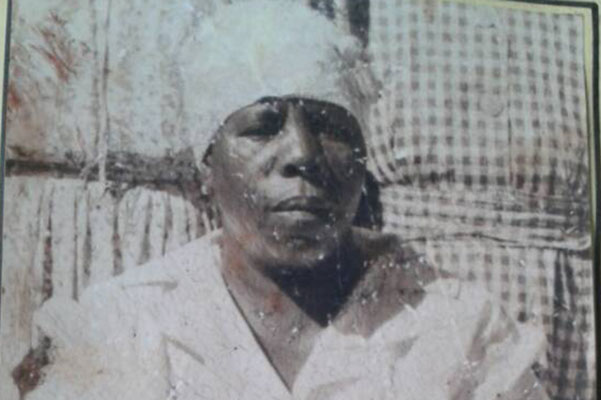
LEGENDS are not made, but are born, their legacy lives forever and ever.
BY BRIAN PENNY

This best describes the life of the late Rhodesian feminist and social worker, Elizabeth Maria Ayema, popularly known as Mai Musodzi, who is also one of Zimbabwe’s 100 most influential women of all time.
Nearly six-and-a-half decades after her death, Mai Musodzi is still celebrated through the work she did for communities. A dance and music fiesta was held recently in Mbare by young artistes from the community to celebrate her work.
“Her life was excellent. She lived it for everyone to benefit out of a number of initiatives. She is sadly missed not only as my grandmother, but as a mother of the community, a women’s rights defender, a leader and a role model,” said 82-year-old Leonard Chabuka, her grandson, in a wide-ranging interview with NewsDay at their family home at 58 3rd Avenue in Mbare.
Chabuka, who is the renowned woman’s eldest grandson, said the home, formerly number 58 Cottage 3rd Street, was located a few metres from Edith Opperman Maternity Clinic, a medical facility which Mai Musodzi successfully lobbied for.
The clinic is located off Addbennie Road in which the Mai Musodzi Hall — which was named after her— is located.

Chabuka, the third child of Mai Musodzi’s only daughter, Lucy Jessy Ayema, who was married to George Chabuka, is the sole survivor of the woman’s five children.
- Chamisa under fire over US$120K donation
- Mavhunga puts DeMbare into Chibuku quarterfinals
- Pension funds bet on Cabora Bassa oilfields
- Councils defy govt fire tender directive
Keep Reading
“I was 17 when Mai Musodzi died at the age of 67. By that time, I had travelled a long journey with her. Mai Musodzi was a human rights defender,” he recalled.
Although Mai Musodzi was allocated a cottage known as “Marriage Quarters” for wedded couples, she found it unfair for fellow women married to foreigners to stay away from their husbands.
She consequently challenged the system in a newly-established court, where Sergeant Vito of the Vito Tavern fame and after whom Vito Road in Mbare was named, was the prosecutor.
Chabuka said his grandmother acted as the defence lawyer, adding that the woman deserved more accolades than just a recreational hall named after her.
“You see, we are talking of a woman who escaped war and carried out all this good work. Apart from a hall, two roads in Mbare are named after her husband, Ayema Street, and her son, Francis Joseph Street,” Chabuka said.
Out of all the Musodzi sons — Luke, Moses, Francis and Raphel — Moses was different, according to Chabuka.
Moses was first a teacher and then became a journalist with African Newspapers. His interest in politics led him to the post of the first chairperson of the Harare branch of the African National Congress in 1957, alongside nationalists James Chikerema and Moses Nyandoro.
“Moses died without a child with his legally married wife Patricia Chatambudza, but some years later two women came to me claiming that their children belonged to Moses,” he said, adding that he helped them secure identity documents.
Francis, who was a teacher and an active member of the Industrial and Commercial Workers Union (ICU) as well as an elected member of the Native Advisory Board, left behind seven children, but only two have survived to this day. They currently live in South Africa and Saudi Arabia respectively. Raphael had seven children and only two, based in Canada and the United Kingdom, are still alive.
Chabuka recalled that there were efforts to set up a Mai Musodzi Trust, but they appeared to have suffered a stillbirth.
“I remember a trust being set up, but somehow the operations were disrupted, so I’m saying if the seven of us (Ayema siblings) come together and form a Mai Musodzi Trust, we can start off from where our grandmother left,” he said.
He said there are a lot of people with an interest in the history of Mai Musodzi and as a family they feel honoured.
Chabuka said two books have been written about Mai Musodzi. One was written by the late Japanese professor, Tsuneo Yoshikuni, and published by his friend, David Harold Barry. It was later published by Weaver Press in Harare in conjunction with Silveira House in 2007. The other book, he said, was done by Lawrence Vambe, but was thin on detail.
“The publishing of these books really helps. It is good for the youngsters as well as the family members of this present generation,” Chabuka said.
He said as a family they were happy about the recent commemorations and specifically cited Harare High School pupils, who recited a poem about Mai Musodzi.
“Those students nailed it. I hope next year the event will be bigger and everyone will be invited,” he said.
Mai Musodzi was born Musodzi Chibhaga in 1885 under Chief Hwata in Mazowe, but was orphaned following the 1896-1897 uprisings against the British colonialists. A niece to the spirit medium Nehanda Nyakasikana, she was later baptised Elizabeth Maria at Chishawasha in 1908 and married a Zambian British South African Police sergeant, Frank Kashimbo Ayema, the following year.
After relocating to Mbare, then known as Harare Township, she became involved in community empowerment initiatives and charity work which benefited many women through an organisation she founded, Harare African Women’s Club, in 1938.
In 1947, she was awarded an MBE (Member of the Most Excellent Order of the British Empire) and was among guests invited to dine at the Government House with Queen Elizabeth I. She died on July 21, 1952 and was buried at Pioneer Cemetery in Mbare.











